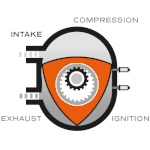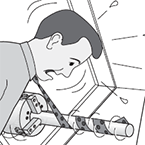|
I know someone who does, he worked for a medical tool manufacturer and now designs and prototypes tools on his own. There seems to be a lot of small shops that make tools, just a different type of machine shop.
|
|
|
|

|
| # ? May 23, 2024 19:31 |
|
Dance Officer posted:Does anyone in this thread know anything about cad/cam and cnc machining in orthopedics? Having finished machinist school recently I've started to think about how I want to develop professionally and what I'd like to end up doing. I like machining but I'd like to focus a bit more on helping and interacting with people, and I'd like to end up doing complex and challenging machining work. Iím a CAM specialist at my SOLIDWORKS reseller; I know some of my colleagues were in orthopedic design but that was back in the 80s I think. Let me know if I can help, Iíve been around the block on a handful of CAM packages and am happy to help if I can!
|
|
|
|
Dance Officer posted:Does anyone in this thread know anything about cad/cam and cnc machining in orthopedics? Having finished machinist school recently I've started to think about how I want to develop professionally and what I'd like to end up doing. I like machining but I'd like to focus a bit more on helping and interacting with people, and I'd like to end up doing complex and challenging machining work. The area I live in has some very large shops that make medical stuff. I don't / haven't worked there but a lot of my coworkers have. They're very regimented. They train people just to the level required and no further. If you want to have your hand in a lot of different stuff, look into job shops. That's what I work at, and it's different every day. Our absolute smartest people are the tool makers. Full machine builds where the customer supplies a general design and specifies say, these 4 points need to be exactly like this, how you get there is up to you. We're working on a laser scanning gauge ATM where they told us the runout and concentricity required between 2 points and the rest is on us. Real tool makers are getting hard to find.
|
|
|
|
I currently work at a job shop (it was an apprenticeship thing where I work 3 days and go to school for 2), and while I have a lot left to learn there I'm probably going to hit a wall at some point. We make a lot of pretty difficult but not really difficult parts, usually a lot of repeat products in small batches as well. The shop isn't very modern in terms of machines, the people doing the programming, the level of automation involved or the tooling used. There's shops around here that do a lot more complex work, but they don't hire people straight out of machinist school to be anything but operators, which I don't want to do. I'd also like to have a social dimension to my work that isn't management.
|
|
|
|
Dance Officer posted:I currently work at a job shop (it was an apprenticeship thing where I work 3 days and go to school for 2), and while I have a lot left to learn there I'm probably going to hit a wall at some point. We make a lot of pretty difficult but not really difficult parts, usually a lot of repeat products in small batches as well. The shop isn't very modern in terms of machines, the people doing the programming, the level of automation involved or the tooling used. Only half joking, join up with a MasterCAM reseller or something and jump ship to a customer. What software package have you worked with? Oftentimes there are certifications for particular software packages and using that in my keywords is how I found my current job. Actual machinist school + software certification + apprenticeship is probably pretty tempting to anyone looking for it.
|
|
|
|
I hadn't considered that and I'll look into it. The Dutch situation to my knowledge is that there's typically one reseller for any given software nationally, and one will have to be in my neck of the woods for it to work at all. I have some experience with EdgeCAM and Fusion, and I'll get some experience with hypermill once my employer sends me on a one week course to learn it. They told me that's in the pipeline at the end of last year but haven't acted on it yet.
|
|
|
|
If you're getting cam experience, and training, and on multiple platforms you're building a hell of a resume. How long have you been doing school / co-op? Cam programmer can open a lot of well paying doors.
|
|
|
|
I was in school for two years, been working at the shop for just as long. It was supposed to take 3 years but I ended up doing it in 2. The experience with edgecam comes from an evening class I took at school, it was weekly for half a year.
|
|
|
|
Nice. The experience break points I've seen are usually 3, 5, and 10 years for job ads. They're not a hard requirement but it gives a rough idea. For general where to go from here, what do you do currently that you really enjoy, and what do you hate?
|
|
|
|
I enjoy the programming that I get to do, which is very infrequently. Normally I'm given work that's already been made before and I have to use the existing programs. The things I genuinely dislike; the repetitive nature of the work that I do, we normally make <50 of any given part but we've also had orders for hundreds, and that usually falls on me to do. That gets boring. And there's the issue that most of my colleagues aren't exactly interested in any sort of social interaction, or any fun to talk to.
|
|
|
|
honda whisperer posted:Our absolute smartest people are the tool makers. Full machine builds where the customer supplies a general design and specifies say, these 4 points need to be exactly like this, how you get there is up to you. We're working on a laser scanning gauge ATM where they told us the runout and concentricity required between 2 points and the rest is on us. I'm curious, what do you think would need to be included to build a tool maker training curriculum to try to get some younger people in? Most job shops aren't going to have the resources/foresight to train in-house, so having an accreditation available seems like the right option. Obviously a fresh graduate would need a lot of on-the-job practice to get really good, it's no replacement for experience. But do you think there's some way to get people the right skillset to at least get started more quickly? Is it even possible to get the required combination of manufacturing/engineering/systems thinking without a decade+ of experience? Or do you really just need to have the right person who's capable of spanning all those different fields? From my perspective, the closest thing right now is precision engineering programs, but that's a very limited pool and it's 8+ years of undergrad/grad school and the graduates have PhDs and way more lucrative options. Kinda makes me think the best way would be an upskilling class for experienced technically-minded machinists to start going into more formal engineering and design. But it's also difficult to imagine job shops letting their best employees take a lot of time to pursue additional education... Not sure I see a good way to square this circle.
|
|
|
|
Dance Officer posted:I enjoy the programming that I get to do, which is very infrequently. Normally I'm given work that's already been made before and I have to use the existing programs. Sounds like a similar shop but with more new parts, programming, and better people would be a good thing to look for. The repetitive part is going to happen anywhere though. It's all just holes in rectangles. Are the programs you re run good? Could they be better? Would your shop let you reprogram them? I cut this cycle time on a repeate part in half is catnip for bosses. Buy me more modern tooling and I can halve it again might give you some wiggle room to modernize the place. Karia posted:I'm curious, what do you think would need to be included to build a tool maker training curriculum to try to get some younger people in? Most job shops aren't going to have the resources/foresight to train in-house, so having an accreditation available seems like the right option. Obviously a fresh graduate would need a lot of on-the-job practice to get really good, it's no replacement for experience. But do you think there's some way to get people the right skillset to at least get started more quickly? Is it even possible to get the required combination of manufacturing/engineering/systems thinking without a decade+ of experience? Or do you really just need to have the right person who's capable of spanning all those different fields? I don't know. Part of it is just down to the individual wanting to try that hard. We have a lot of talented machinists that just want to make details and check out all day. Currently we have 2 trainees. Zero experience when they started, early 20s. They've been at it 6 months and are coming along but it'll be years. We're guessing they'll be just a sunk cost for at least a year, maybe break even after. Well send anyone out for training. At least once. If they come back and incorporate what they learned we'll keep sending them.
|
|
|
|
Karia posted:I'm curious, what do you think would need to be included to build a tool maker training curriculum to try to get some younger people in? Most job shops aren't going to have the resources/foresight to train in-house, so having an accreditation available seems like the right option. Obviously a fresh graduate would need a lot of on-the-job practice to get really good, it's no replacement for experience. But do you think there's some way to get people the right skillset to at least get started more quickly? Is it even possible to get the required combination of manufacturing/engineering/systems thinking without a decade+ of experience? Or do you really just need to have the right person who's capable of spanning all those different fields? First semester is learning every version of ďthe old ball bearing trick.Ē First time I used trig IRL I realized how bad my math curricula were.
|
|
|
|
Iím not a machinist but I think a big part of it is the million little odd ways you learn along the way to solve problems. Thereís alot of Ďoh remember that thing we did on the Jones job? I wonder if that would work hereÖí. I think that may be hard to teach in a compressed school setting, especially when you pick up alot of those tricks from the guy whoís 60 and been at it 40 years. Experience also gives you a decent baseline gut feeling for Ďwill that workí which can be a bad thing as it makes one less willing to experiment with new things, but also can save a lot of time and wasted effort barking up the wrong tree. E: itís also different if you go to school without much practical experience first-without the hands on real world knowledge of practical work flow and the way things are done in a real shop setting, itís hard to appreciate what youíre learning. Itís easy to think the wrong things are important when you donít have that shop floor experience. Kaiser Schnitzel fucked around with this message at 14:27 on Jun 19, 2023 |
|
|
|
Tool making is a weird niche that calls upon a mix of skills that don't get taught to the extent that you'd need to really get good at it, in the educational system at least. Engineering school is all theory, no hands-on experience. Vocational school is just enough theory to get you to do the practical part, and once employed, most places aren't too interested in training you further than just what's needed to the job. I feel like it's really a case of there being a clear and unambiguous demand for tool makers, but no-one* is willing or capable to establish a clear educational/vocational pathway for training them. *(Many years ago I did visit a Dutch university that had a tool makers vocational school next to it that was established explicitly to train people to be able to make all the weird contraptions physicists needed, but as far as I know, those places are a big exception.)
|
|
|
|
There's a big push in the US vocational schools to be on a path to certification with a degree instead of a degree for the sake of a degree. It checks industry boxes instead of the educational ones, but if the outcomes aren't broad in the proper way then they are still not useful. I sit on an advisory board for a Mechatronics program and some of the other members have very specific requirements, one guy needs CNC repair experience, another guys needs Siemens only, another one needs glorified electricians. None of them are happy with the system as it is, even though they see the utility of a broad skillset. But how broad? Which skills? I see a lot of people speak highly of the Swiss/German educational method in regards to technical training, but I've not experienced it myself. Supposedly the training focuses on the problem first and then teaches you the methods and theory instead of the other way around. I felt my associates degree was slow and not terribly well focused while my bachelors was project based without regard for time so I had to bust my rear end way more than my associates required. My main focus was electrical engineering, but the project (What they called an Enterprise) was a multi-disciplinary team that worked on a large and complex task. In this case a micro-satellite for NASA. So I did work with other EE's, but also coordinated with the ME's and the CS folks. It felt way more useful than just doing theory and a couple of hours of labs on a whole bunch of topics. The trades in the US seem to have a good path, you'll learn a wide variety of skills in the classroom and have ample space to use them every day on a job site, but how do you translate what works for a pipefitter or boilermaker into a blue-white collar environment as a machine builder?
|
|
|
|
|
Just Winging It posted:Tool making is a weird niche that calls upon a mix of skills that don't get taught to the extent that you'd need to really get good at it, in the educational system at least. Engineering school is all theory, no hands-on experience. Vocational school is just enough theory to get you to do the practical part, and once employed, most places aren't too interested in training you further than just what's needed to the job. I feel like it's really a case of there being a clear and unambiguous demand for tool makers, but no-one* is willing or capable to establish a clear educational/vocational pathway for training them. Boy oh boy, this goes places that just aren't fun to talk about. You can easily train people to do ~a thing~. It might not be possible, or it might just be exceedingly difficult to teach people to think with "ideas" versus "set tools". We all have disassembled things and gone "what dead monster designed this." Or seen parts come from machine shops that you just can't comprehend how they messed things up that badly.. and THEN shipped it to a customer? I spent most of my life thinking machinst was also a synanym for clever/creative/problemsolver. Given who I saw as machinists in my life... I wasn't wrong? It wasn't until much later in life that I ran across machinists who WERE NOT clever. I think there's something to be said about the number of fingers and the sort of person who went into machining. .. I didn't know any directly who were missing body parts. THAT SAID, my dad hired a few that were. You also don't hear much about the halfass engineers. Becuase they're out there. The number of times I"ve heard from machinists in my life who got drawings that were imposible.... Or I've had to take a set of drawings and creatively interpet them to figure out what the heck they were trying to say. But the ~really good ones~ (both engineers and machinists, and designers in general) are few, and very far between. Things need to be made. We need the "well they get the job done" people. And lots of them. The "push bottan, part made" people matter. As well as the people who can take a drawing, mirror it, and put the "left hand" stuff on it. There was, for decades, a path for tool makers. It's broken now, because no company is willing to keep someone hired for the 10-20-30 years it takes to get there. And old crusty people who think good, new, people need to earn their way there over a decade. ................. The funny thing is. This isn't a machinist problem. You'll see the same thing with mechanics, plumbers, HVAC techs, general contractors... And then how many are using the clever for ripping someone off, as opposed to doing a job well? I know I go to the same mechanic becuase he and his shop is clever, and good.
|
|
|
|
Not sure whether to put this in this thread or the electronics thread, but this seems more appropriate. Our main lathe is a nice old South Bend heavy 10. It has the usual four-speed belt drive with back gearing. Its maximum speed is something like 1400 RPM on the small pulley. We do a lot of parts in aluminum and mild steel less than an inch in diameter, and this is barely fast enough for HSS, forget about carbide. Would a VFD be able to run the old motor in this faster than its designed RPM? I do not know much about industrial motor control at all. Sagebrush fucked around with this message at 19:00 on Jun 19, 2023 |
|
|
|
Sagebrush posted:Not sure whether to put this in this thread or the electronics thread, but this seems more appropriate. I would think youíd be better off either swapping the motor for a higher speed one or changing up the pulley on the motor shaft or drive shaft to get higher speed via pulley ratios.
|
|
|
Sagebrush posted:Not sure whether to put this in this thread or the electronics thread, but this seems more appropriate. Technically yes, realistically no for some of the reasons Kaiser has mentioned. We've found that balance becomes a huge factor as the rotating assemblies in those machines are not designed to spin that fast. Our rule of thumb is no faster than 10% of rated top speed. The really high velocity can, depending on the oiling arrangement, sling away any oil before it gets to the contact zone of the gear box. So while it may be in the oil bath, the oil is either foam or slung out. Gear lube mayonnaise is a thing.
|
|
|
|
|
honda whisperer posted:Sounds like a similar shop but with more new parts, programming, and better people would be a good thing to look for. The repetitive part is going to happen anywhere though. It's all just holes in rectangles. The programs I re run are typically okay. Typically the speeds and feeds are way slower than they can be on aluminium, for stainless idk. The few times I pushed harder with stainless the tools also didn't last as long. It's all done in 3-axis with mazatrol still so if I am finally allowed to go learn hypermill/get taught how to use the 4th axis on my machine I could probably start seriously speeding up machining time with more efficient toolpathing and fixturing.
|
|
|
|
Kaiser Schnitzel posted:You can, but there are a lot of potential reasons not to. Cooling, bearing ratings, etc. and torque also decreases with speed. This is a pretty good write up from the NIH of all places. https://orf.od.nih.gov/TechnicalRes...ulletin_508.pdf Yooper posted:Technically yes, realistically no for some of the reasons Kaiser has mentioned. We've found that balance becomes a huge factor as the rotating assemblies in those machines are not designed to spin that fast. Our rule of thumb is no faster than 10% of rated top speed. The really high velocity can, depending on the oiling arrangement, sling away any oil before it gets to the contact zone of the gear box. So while it may be in the oil bath, the oil is either foam or slung out. Gear lube mayonnaise is a thing. Hmm, bummer. Well at least it means I don't need to keep researching VFDs. Unfortunately the main drive pulleys on this thing are these multi-stepped beasts and I don't think there is an easy way to swap them, nor do I really want to replace the whole motor, which works fine. Maybe I can look at replacing the pulley on the countershaft. I've never dug into that part of the machine before. Hmmm.
|
|
|
|
I've been thinking more on the how to make a tool maker training. Maybe make a course but it's for experienced machinists. Everyone in it should be able to make details to print, and have the course focus on stack up error and gd&t, and how to make the final product come out as needed.
|
|
|
honda whisperer posted:I've been thinking more on the how to make a tool maker training. Maybe make a course but it's for experienced machinists. Everyone in it should be able to make details to print, and have the course focus on stack up error and gd&t, and how to make the final product come out as needed. Best practice would be great to see so you're not re-learning about locating pins, or setup aids, or tombstone arrangements. Hell even just reading through Carr-Lane and discussing what all that poo poo is for. At the point where someone is ready to be a tool-maker, just being exposed to all of the cool solutions should spark an "Oh!" moment. Same with add on operations, how do you dimension so the surface grinder can do his job, or when do you Blanchard grind instead of surface grind? Is nitriding great, how about chrome? How do you spec out hardness and hardening?
|
|
|
|
|
Are most of the tools toolmakers maker for stamping metal or is it a much broader scope of work? Iím not really familiar enough with manufacturing to know exactly what it is a tool maker does.
|
|
|
Kaiser Schnitzel posted:Are most of the tools toolmakers maker for stamping metal or is it a much broader scope of work? Iím not really familiar enough with manufacturing to know exactly what it is a tool maker does. It's a really broad term. One shop might have a person who makes a special jig for stamping metal while another designs a fixture plate for measuring parts on a CMM. The tough part is depending on the size of the shop, that person may only design CMM fixtures for an entire career. So yes, they are a toolmaker, as in they make left handed monkey wrench fixtures, but couldn't make a milling fixture in reasonable time. In our shop I work with another pair of machinists to do lead anode tooling, custom machine tools, custom spindles, custom gaging, all to support internal production. I guess I'm a toolmaker, but my business card (lol) says Manufacturing Engineer. So there's some weird overlap in terminology and trades.
|
|
|
|
|
Sagebrush posted:Not sure whether to put this in this thread or the electronics thread, but this seems more appropriate. To throw another wrench at things, it looks like the SB10 uses plain bearings in the headstock. Those really don't like RPM.
|
|
|
|
Not sure where to ask, but this thread seems like the place with people most likely able to point me where I need to go. I'm trying to restore/use a 40 year old pen plotter, a PRN-C41 that uses the alps mechanism apparently popular in the 80s. It uses these terrible plastic pinion gears. There's a seller on eBay that has replacement drive gears, but I'm having an issue with one of the other gears. It keeps slipping about 1mm. Some of the larger gears have clamps holding them in, but this one (along with the drive gears) appear to be friction fit. Is there something obvious I'm missing i could do to keep the gear in place? And if I want/need to get a brass replacement, where do I go to get that fabricated?  
|
|
|
|
leper khan posted:Is there something obvious I'm missing i could do to keep the gear in place? Is the join metal on plastic? If itís metal on metal youíve got loads of options from Loctite. If not, you might be stuck with hitting the drill press and hand tap to get a set screw in there. quote:And if I want/need to get a brass replacement, where do I go to get that fabricated? The answer varies on whether itís a custom gear or not. If you can figure out the diameter and number of teeth thatíll answer whether you can get something off the shelf from McMaster or need to get it made elsewhere. On that note, has anyone here used a fiber laser cut or water jet cut gear? If the material is thin enough and itís an uncommon gear, Send Cut Send could probably make you one pretty cheap. I just donít know if theyíre too sloppy coming off a hot process like lasers for precision use. Plenty of folks here know more than me so Iím just spitballing with where Iíd start.
|
|
|
|
There's only a tiny chance that they're non standard gears. If you google how to reverse engineer nylon printer gears, I bet you'll be able to find some guide on getting the critical measurements to spec new ones.
|
|
|
|
Yooper posted:It's a really broad term. One shop might have a person who makes a special jig for stamping metal while another designs a fixture plate for measuring parts on a CMM. The tough part is depending on the size of the shop, that person may only design CMM fixtures for an entire career. So yes, they are a toolmaker, as in they make left handed monkey wrench fixtures, but couldn't make a milling fixture in reasonable time. In our shop I work with another pair of machinists to do lead anode tooling, custom machine tools, custom spindles, custom gaging, all to support internal production. I guess I'm a toolmaker, but my business card (lol) says Manufacturing Engineer. So there's some weird overlap in terminology and trades. Might be a regional/cultural thing. In my experience, tool and die is a very specific subsect of machining. Making fixtures of any kind is applications/process engineering. I did work at one place that sometimes referred to its manual mill and lathe department as the tool room, but the guys there were mostly doing operations for production parts, not in house stuff. Either way I would be surprised to hear anyone call them a toolmaker when they don't make or regrind machine tools.
|
|
|
|
That gear nearest the camera is called an anti-backlash gear. That might help your search. If you find the part you need, it's likely to be a aliexpress type order. Anti-backlash gears have a spring in them, and two gear faces that are used to pinch the next gear over. They're neat! To be silly, if you're smooth-ish on the phone, you might be able to talk to the engineering department to figure out what you need too. (I've done that a few times...)
|
|
|
|
Nerobro posted:That gear nearest the camera is called an anti-backlash gear. That might help your search. If you find the part you need, it's likely to be a aliexpress type order. Anti-backlash gears have a spring in them, and two gear faces that are used to pinch the next gear over. They're neat! Replacement part numbers are listed in the service manual. I don't really expect Sony has any stock of 40 year old parts, but it would be an amusing phone call with their parts/service group. Especially since I believe the product in question was only available in Japan and Europe. I take it to mean that this gear is designed to stop/stabilize the mechanism? That makes sense, the rod it's attached to is the driver for the y axis assembly that feeds paper.
|
|
|
|
it helps take up the slack between the gears so when it goes from feeding paper in to feeding it out theres no slack that could mess up the positioning of the pen on the paper. Prevents a little deadzone when the gear train changes direction basically.
|
|
|
|
Sill making little parts and fittings for the shop out of the seemingly infinite supply of mild steel we have in the back room. I can achieve an okay finish at maximum speed with a razor sharp HSS tool (and quite a nice finish, albeit a slow one, with a shear tool for the final pass) but man I do not like working with that stuff in general. I once turned down a generic AutoZone socket to make a spark plug wrench that would fit the deep wells on my motorcycle heads. It was the most beautiful steel-turning experience I've ever had. A perfect finish with zero tear-out. What grade of steel would likely be used for a socket, so that I can try to buy that if I need to?
|
|
|
Sagebrush posted:Sill making little parts and fittings for the shop out of the seemingly infinite supply of mild steel we have in the back room. I can achieve an okay finish at maximum speed with a razor sharp HSS tool (and quite a nice finish, albeit a slow one, with a shear tool for the final pass) but man I do not like working with that stuff in general. 4140, 8650, or a 6000 series Chrome Vanadium steels.
|
|
|
|
|
Maybe this is a long shot, but anyone know if there are any good spots in the Seattle area to buy odds and ends from the scrap/ cut-off bin? I keep ordering protoboxes from online metals to stock up on random bits and pieces but I wonder if thereís a better way to get my fix. For the protoboxes I pay about a buck a pound for steel but I get no choice in size or shape.
|
|
|
|
Same, but east bay Moose Metals in Concord has great on hand supply but their cut off box was pretty meager
|
|
|
Look at this giant rear end box!  We had to break out the big big forklift.  A bag inside a box!  Ooo!  The machine looks solid, but the documentation is garbage tier. Setup instructions are like "1. Touch part to wheel. 2. Press Set Master button to set size. 3. Verify master registry. 4. Run parts." Without ever telling you how to do any of that and there is no Set Master button I can find. Plus there's like a 12 hour time difference so any question I ask takes a day for a response. We managed to get it running today but I think there's a setup program missing as the Y axis probe isn't working properly. Yah, holiday weekend will be spent learning Fanuc Macro programming. 
|
|
|
|
|

|
| # ? May 23, 2024 19:31 |
|
Hadlock posted:Same, but east bay https://alcometals.com/metal-sales/ Alco Metals in Oakland is a new/surplus/scrap metal dealer that both buys from and sells to the public. They do a lot of business with pros too so if you do go in, don't expect to monopolize the time of an employee, they don't care much about people buying $100 of cutoffs, but last time I was there they were nice enough about my purchasing some random bits from the bin.
|
|
|


























